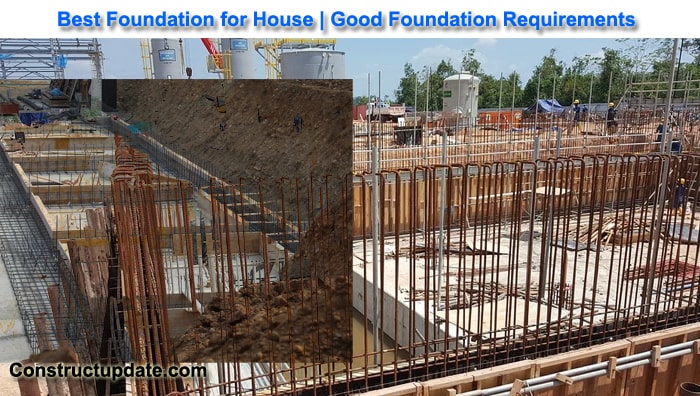Best Foundation for House | Good Foundation Requirements | Strongest Foundation for Hosue
What is Foundation?
A home foundation is an important and necessary aspect of its structure. It is just the house’s lowest portion or structure, which supports the rest of the building. All loads from the upper section of the building are safely transferred to the ground.
The majority of foundations are made of sturdy materials to keep the house in place during earthquakes and cyclones. As a result, they are usually formed of concrete, which is the most durable building material.
What is the most appropriate foundation for a home?
- Because the foundation is one of the most significant parts of the building, the strongest foundation for a house is quite important in its construction.
- Only a sturdy and rigid foundation can support the entire weight of the building.
- If the structure’s foundation isn’t properly planned and isn’t strong enough to support the structure’s weight, there’s no point in spending money on the building’s superstructure.
- As a result, it is critical that you choose the greatest foundation for your home. It is important to ensure that the foundation is built using high-quality building materials.
- It is necessary to test the building materials used in the foundation’s construction. The material must meet all of the requirements set forth by Indian specifications.
- The ideal house foundation should be made of strong building materials in order to provide optimum structural stability to the structure and to keep the house stable during cyclones and earthquakes.

Foundation Types:
What Is the Strongest House Foundation?
The sort of foundation that is appropriate for the project relies on the type of soil on the site as well as the type of building that we are constructing.
Shallow foundations are utilised in the construction of lightweight or temporary structures, whereas deep foundations are employed in the construction of high-rise buildings.
The majority of foundations are made of sturdy materials to keep the house in place during earthquakes and cyclones. As a result, they are usually formed of concrete, which is the most durable building material.
Good Foundation Requirements:
The fundamental requirement for any structure’s load-bearing capacity is that it be built in such a way that the combined dead loads, live loads, horizontal loads such as earthquakes, and wind loads can be safely resisted, carried, and transmitted to the ground without structural damage, deflection, or distortion.
The foundation should be dug deep enough into the ground to prevent the structure from being harmed by ground movement such as swelling. Shrinking and freezing are two words that come to me when I think of shrinking and The building’s stability should also be unaffected by the landslide. The structure must be protected from damage and suffering.
The foundation base should be robust in order to minimise differential settling, particularly when superimposed loads are not evenly distributed across the foundation.
The foundation should also be situated so that its performance is unaffected by future influences like as earthquakes and overloading.
Foundations must be designed to withstand the worst-case loading scenarios in order to prevent overturning and sliding.
The foundation should be resistant to soil chemicals. Groundwater and soil may contain a variety of compounds that are damaging to foundation concrete, with sulphates being the most aggressive. Sulphate attack may typically be avoided by using sulphate-resistant cement, but even this will not be a complete solution unless the concrete is placed with care, vibrated, and cured properly.
Though soil bearing capability is good at sufficient depths, the foundation should be dug deep enough to resist overturning. Also, it must be deep enough to be free of edoema and swelling.





